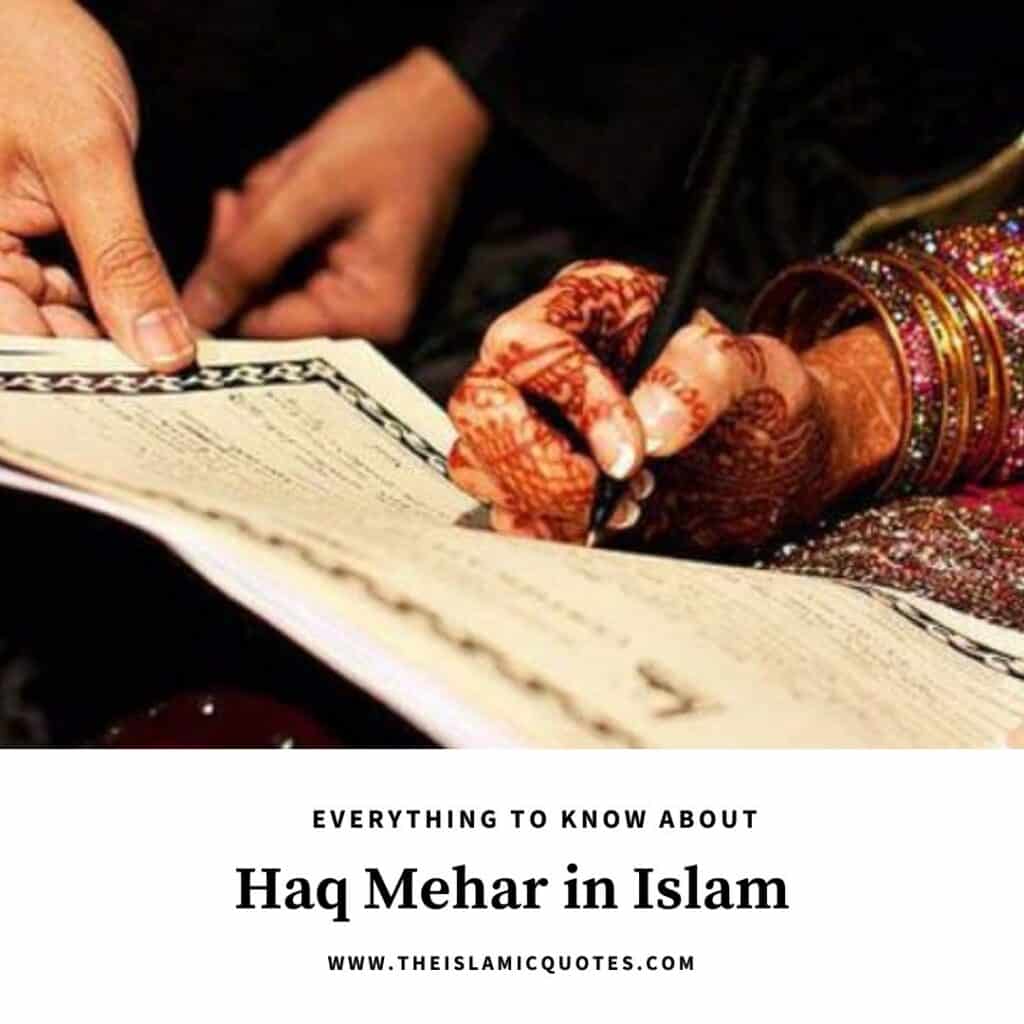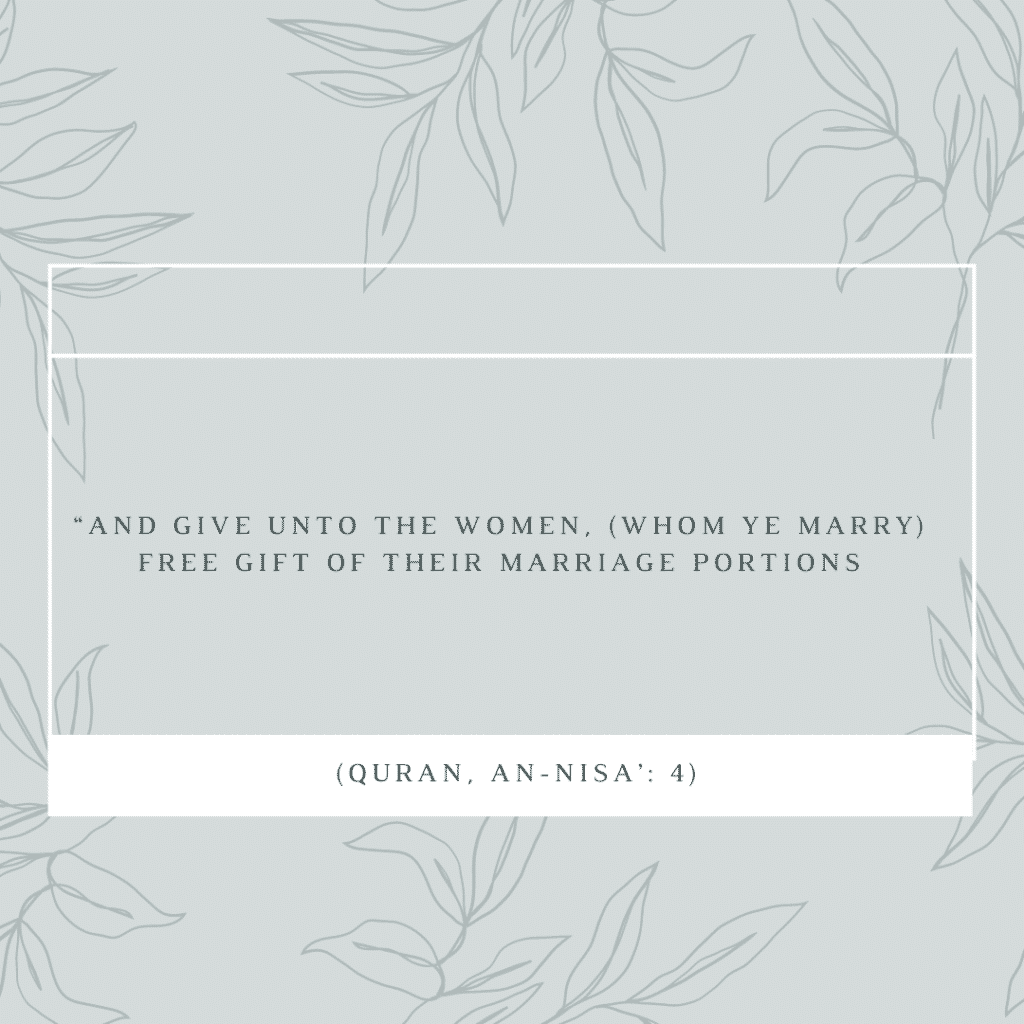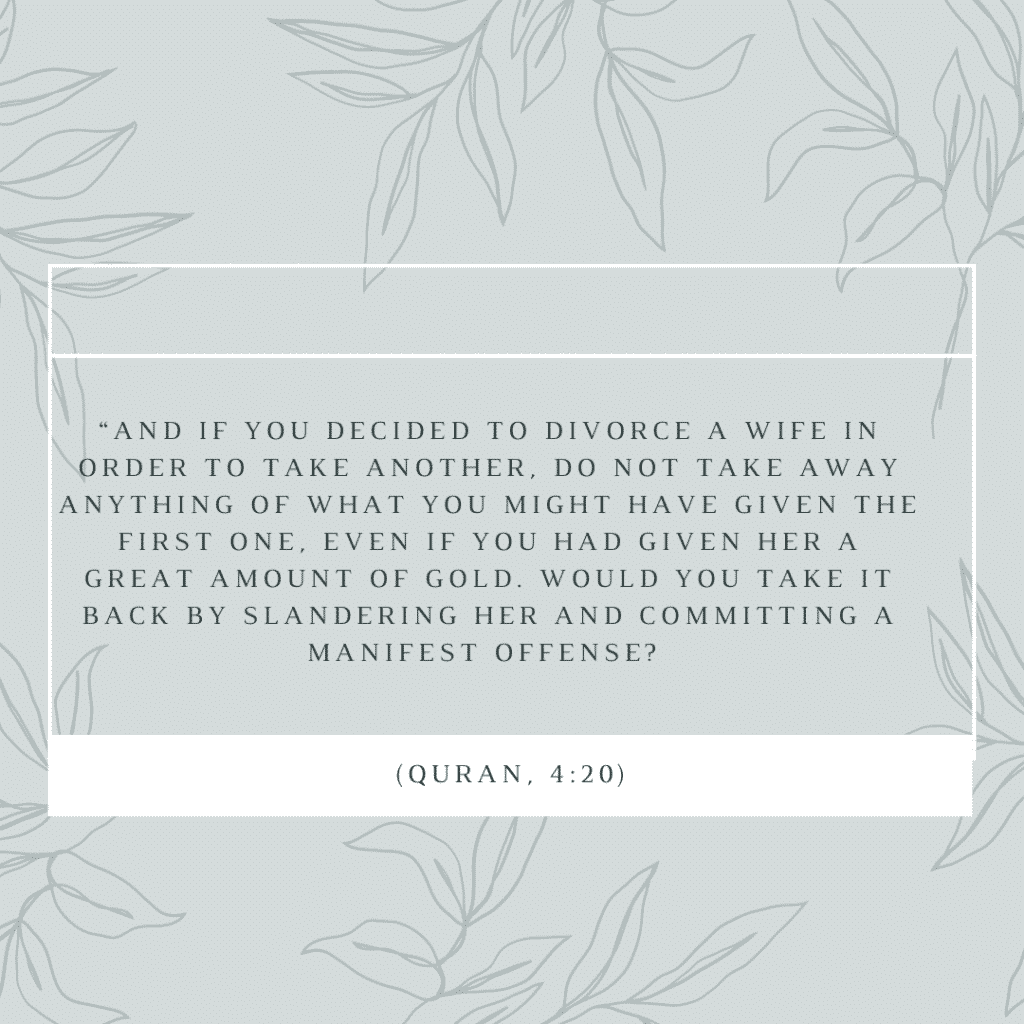Haq mehr in Islam: We are all aware that before the arrival of Islam, the situation of Arab women was terrible, with the exception of a few upper-class ladies. However, if one attempted to clarify their position in legal terminology, it might be defined simply in one word “property.”
An Arab woman with little or no social rank did not have the right to own or inherit. Arab men could marry as many women as they wanted, divorce them anytime they pleased, and even inherit women who were their fathers’ wives. Women had no right decision for themselves, especially when it came to marriage.
What Is Haq Mehr In Islam?
In light of this, the revelation of the following Quranic verse was both freeing and redemptive:
Islam has granted various privileges to both genders who are bound by a marriage relationship, as you can learn from our post on Marriage In Islam. Mahr’s rights are among the most essential of a wife’s rights. This is the sum of money that a husband is supposed to provide to his wife upon the completion of the marriage contract.
Haq Mehr is defined as a sum of money or other property promised by the husband to be paid or handed to the woman in exchange for the marriage, even if it is not specifically mentioned or fixed at the time of the marriage. However, one must know the following things about Haq Mehr.

5 – Who Decides Haq Mehr?
The Haq Mehr is decided by the Muslim female. If it’s too much, you can bargain and lessen it, but she must agree.
The Haq Mehr knows no bounds. Umar (Ra), the second khalif of Islam, attempted to set a limit until he was accounted for by a woman. She argued that if the Prophet (saw) had not set a limit on him, how could he? He realized his error and changed his mind. Without mahr, the nikah contract is null and void. It is one of the nikah criteria that, if disregarded, will render the nikah null and void. It could be a tiny sum, but it has to be something.
4 – It Should Not Be Less Than the Amount Fixed By Shariah
The minimum quantity of Mehr is ten Dirham or the equivalent in US dollars (30.618-gram silver). According to Shariah, Mehr is not valid if it is less than it. There is no upper limit on the number of Mehr. You may fix as much Mehr as you choose with the approval of the girl and her guardians, subject to your financial capabilities. Yes, according to Shariah, it is not permissible to fix additional mehr solely for the purpose of boasting and showing off, or with the objective of not paying it.
3 – Types Of Haq Mehr in Islam
There are two types of mehr, depending on the form of payment: mu’ajjal, or quick, and muwajjal, or deferred. Deferred payment is permitted for people who anticipate receiving payments at a later date. However, postponing payment unduly is a breach of contract. Some parents, in an attempt to be devout, claim that they are willing to fix their daughters’ mehr at the rate of the sharai mehr, which some elders have calculated to be the astonishing amount of Rs32.25! It is difficult to say where they obtained this figure. Sharia, or Islamic law, has not established or even recommended any amount that could be referred to as the sharai mehr.
I would also recommend that you go through these 100+ Islamic Marriage Quotes For Husband and Wife
2 – Haq Mehr Doesn’t Mean to Overburden Someone
As you know now Haq mehr is a wedding gift given by a husband to his wife. It may be anything such as property, jewels, or cash. According to Islam, there should be no pressure on the groom when deciding on the Haq Mehr, which should be presented during the marriage. However, our society has shifted the concept. Haq Mehr is now typically handed to the woman following a divorce.

It is not advisable that a large amount of Haq Mehr be demanded.
When you return to the concept’s essential pillars, which are “respect,” “security,” and “means of the spouse,” calculating Mehr becomes simple. The idea of Haq Mehr does not encourage overburdening anyone. The Prophet (PBUH) is said to have advised a poor man to teach his wife to read as her Haq Mehr. What is suggested is that before allocating a budget for any incidental and transitory events of marriage, men should first contribute from their “means” what they feel to be appropriate “security” and “respect” for women of their own family, as Haq Mehr of their prospective wives.
1 – No One Is Spared from Giving Haq Mehr
Nobody is exempt from having to pay the mehr. From a common man to the Prophets.

When Hazrat Ali approached the Prophet to ask for Bibi Fatima’s hand in marriage, the Prophet’s first question was, “Do you have anything to give as mehr?” He claimed to own a horse and a saddle.
He sold his saddle and brought it to the Prophet for 480 dirhams. This sum was sufficient to meet the bride’s and the new household’s immediate needs. The concept of jahez, or the bride’s family lavishing her with household goods and gifts, does not exist in Islam. Learn more on this from our post on Dowry in Islam & 7 Reasons Why Dowry is a Curse.
On her husband’s deathbed, the widow is sometimes urged to forgive him. But still, the Mehr remains a liability on the husband throughout his life, and when he dies, his heirs inherit this debt and are obligated to pay it.
The inclusion of mahr in Islamic marriage represents a system that promotes love and respect. Its moral value outweighs its monetary value. In a religion that grants males the freedom to divorce and polygamy, the concept of mahr strengthens a wife’s bargaining power in her marital contract.

Marriages nowadays are handled with tremendous pomp and show, and a great deal of riches is wasted. If instead of spending so much money on meaningless things, the payment of mehr is prioritized, it would signify fulfilling a religious commitment. It would also be more in line with Quranic injunctions and the Prophet’s example and could provide some protection to the bride, particularly if she can invest the money profitably.






